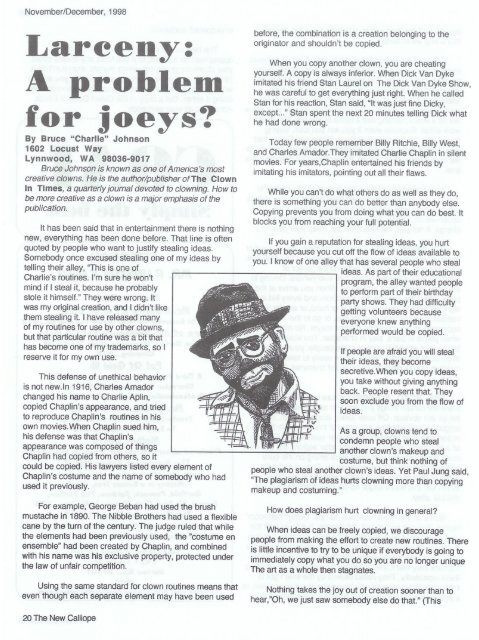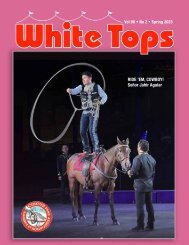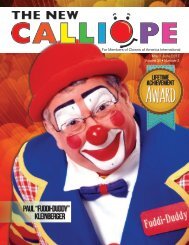Nov_Dec_1998
You also want an ePaper? Increase the reach of your titles
YUMPU automatically turns print PDFs into web optimized ePapers that Google loves.
<strong>Nov</strong>ember/<strong>Dec</strong>ember , <strong>1998</strong><br />
Larceny:<br />
A problem<br />
for joeys?<br />
By Bruce "Charlle" Johnson<br />
1602 Locust Way<br />
Lynnwood, WA 98036-9017<br />
Bruce Johnson is known as one of America's most<br />
creative clowns. He is the author/publisher of The Clown<br />
In Times, a quarterly journal devoted to clowning. How to<br />
be more creative as a clown is a major emphasis of the<br />
publication.<br />
before, the combination is a creation belonging to the<br />
originator and shouldn't be copied.<br />
When you copy another clown , you are cheating<br />
yourself. A copy is always inferior. When Dick Van Dyke<br />
imitated his friend Stan Laurel on The Dick Van Dyke Show,<br />
he was careful to get everything just right. When he called<br />
Stan for his reaction, Stan said, "It was just fine Dicky,<br />
except..." Stan spent the next 20 minutes telling Dick what<br />
he had done wrong.<br />
Today few people remember Billy Ritchie, Billy West,<br />
and Charles Amador.They imitated Charlie Chaplin in silent<br />
movies. For years.Chaplin entertained his friends by<br />
imitating his imitators, pointing out all their flaws.<br />
While you can't do what others do as well as they do,<br />
there is something you can do better than anybody else.<br />
Copying prevents you from doing what you can do best. It<br />
blocks you from reaching your full potential.<br />
It has been said that in entertainment there is nothing<br />
new, everything has been done before. That line is often If you gain a reputation for stealing ideas, you hurt<br />
quoted by people who want to justify stealing ideas. yourself because you cut off the flow of ideas available to<br />
Somebody once excused stealing one of my ideas by you. I know of one alley that has several people who steal<br />
telling their alley, "This is one of .-----------------, ideas. As part of their educational<br />
Charlie's routines. I'm sure he won't program, the alley wanted people<br />
mind if I steal it, because he probably to perform part of their birthday<br />
stole it himself." They were wrong. It party shows. They had difficulty<br />
was my original creation, and I didn't like getting volunteers because<br />
them stealing it. I have released many everyone knew anything<br />
of my routines for use by other clowns, performed would be copied.<br />
but that particular routine was a bit that<br />
has become one of my trademarks, so I<br />
reserve it for my own use.<br />
This defense of unethical behavior<br />
is not new.In 1916, Charles Amador<br />
changed his name to Charlie Aplin,<br />
copied Chaplin's appearance, and tried<br />
to reproduce Chaplin's routines in his<br />
own movies. When Chaplin sued him,<br />
his defense was that Chaplin's<br />
appearance was composed of things<br />
Chaplin had copied from others, so it<br />
could be copied. His lawyers listed every element of<br />
Chaplin's costume and the name of somebody who had<br />
used it previously.<br />
If people are afraid you will steal<br />
their ideas, they become<br />
secretive. When you copy ideas,<br />
you take without giving anything<br />
back. People resent that. They<br />
soon exclude you from the flow of<br />
ideas.<br />
As a group, clowns tend to<br />
condemn people who steal<br />
L-------------------' another clown's makeup and<br />
costume, but think nothing of<br />
people who steal another clown's ideas. Yet Paul Jung said,<br />
"The plagiarism of ideas hurts clowning more than copying<br />
makeup and costuming."<br />
For example, George Beban had used the brush<br />
mustache in 1890. The Nibble Brothers had used a flexible<br />
cane by the turn of the century. The judge ruled that while<br />
the elements had been previously used, the "costume en<br />
ensemble" had been created by Chaplin, and combined<br />
with his name was his exclusive property, protected under<br />
the law of unfair competition.<br />
Using the same standard for clown routines means that<br />
even though each separate element may have been used<br />
How does plagiarism hurt clowning in general?<br />
When ideas can be freely copied, we discourage<br />
people from making the effort to create new routines. There<br />
is little incentive to try to be unique if everybody is going to<br />
immediately copy what you do so you are no longer unique<br />
The art as a whole then stagnates.<br />
Nothing takes the joy out of creation sooner than to<br />
hear,"Oh, we just saw somebody else do that." (This<br />
20 The New Calliope







